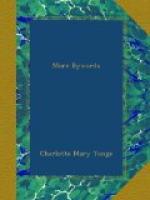II
The long keels have the Needles past,
Wight’s fairest bowers are flaming fast;
From Solent’s waves rise many a mast,
With swelling sails of gold and red,
Dragon and serpent at each head,
Havoc and slaughter breathing forth,
Steer on these locusts of the north.
Each vessel bears a deadly freight;
Each Viking, fired with greed and hate,
His axe is whetting for the strife,
And counting how each Christian life
Shall win him fame in Skaldic lays,
And in Valhalla endless praise.
For Hamble’s river straight they steer;
Prayer is in vain, no aid is near—
Hopeless and helpless all must die.
Oh, fainting heart and failing eye,
Look forth upon the foe once more!
Why leap they not upon the shore?
Why pause their keels upon the strand,
As checked by some resistless hand?
The sail they spread, the oars they ply,
Yet neither may advance nor fly.
III
Who is it holds them helpless there?
’Tis He Who hears the anguished prayer;
’Tis He Who to the wave
Hath fixed the bound—mud, rock, or sand—
To mark how far upon the strand
Its foaming sweep may rave.
What is it, but the ebbing tide,
That leaves them here, by Hamble’s side,
So firm embedded in the mud
No force of stream, nor storm, nor flood,
Shall ever these five ships bear forth
To fiords and islets of the north;
A thousand years shall pass away,
And leave those keels in Hamble’s bay.
IV
Ill were it in my rhyme to tell
The work of slaughter that befell;
In sooth it was a savage time—
Crime ever will engender crime.
Each Viking, as he swam to land,
Fell by a Saxon’s vengeful hand;
Turn we from all that vengeance wild—
Where on the deck there cowered a child,
And, closely to his bosom prest,
A snow-white kitten found a nest.
That tender boy, with tresses fair,
Was Edric, Egbert’s cherished heir;
The plaything of the homestead he,
Now fondled on his grandame’s knee;
Or as beside the hearth he sat,
Oft sporting with his snow-white cat;
Now by the chaplain taught to read,
And lisp his Pater and his Creed;
Well nurtured at his mother’s side,
And by his father trained to ride,
To speak the truth, to draw the bow,
And all an English Thane should know,
His days had been as one bright dream—
As smooth as his own river’s stream!
Until, at good King Alfred’s call,
Thane Egbert left his native hall.




